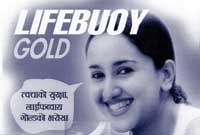 Sandip Ghose, Nepal Lever's Managing Director sat down to do his arithmetic recently and realised that it had stopped making business sense to continue exporting toothpaste to India. The loss on every ton of export added up to Rs 20,000 after new Indian excise on manufacturer's end price. The CEN-VAT differential made producing a ton of toothpaste here Rs 6,000 more expensive than doing it in India.
Sandip Ghose, Nepal Lever's Managing Director sat down to do his arithmetic recently and realised that it had stopped making business sense to continue exporting toothpaste to India. The loss on every ton of export added up to Rs 20,000 after new Indian excise on manufacturer's end price. The CEN-VAT differential made producing a ton of toothpaste here Rs 6,000 more expensive than doing it in India. Toothpaste sales-Nepal's second largest export to India and Nepal Lever's second largest export after soaps-took a major hit after New Delhi levied tariffs in the last budget based on the manufacturers end price or MRP and not the transaction cost. The second whammy was India's new policy of extending credits on central Value Added Tax to local businesses on raw and packaging materials.
There was nothing else for Ghose to do: stop exporting to India and concentrate on the domestic Nepal market. Still, year-end sales up to mid-July 2001 showed that Nepal Lever still managed a reasonably tidy profit. Domestic growth was up 21 percent over the previous year, which offset the drop in export earnings.
"We could have had even higher domestic sales had it not been for internal disturbances in the last two fiscal years," says Ghose. "Because our primary focus is on growing domestic sales and maintain a thrust on sustainable value added exports side-by-side, we are still doing well."
Even so, the export drop hit the bottom line. Nepal Lever's net profits in the year ending mid-July 2001 dropped by half, from Rs 120.5 million a year ago to Rs 68 million. Duty drawback payments due from government also contributed to low profits. Nepal Lever says it is responding by targeting products to the local market and finding innovative ways to take the products to the people.
One such experiment is its "Hub and Spoke" distribution model where there is a secondary hub, say, in Baglung, which is an offshoot of a larger distribution point in Pokhara. From Baglung its products are distributed to smaller stockists within a given periphery. The smaller stockholders then do the local distribution instead of the company trying to sell directly to wholesalers and consumers.
Examples of some newly introduced products, targeted to the Nepali market, are the Wheel detergent sachet priced at Rs 2 and a new variant of its hand-wash Lifebuoy (Rs 10). Lifebuoy's launch is accompanied by a nationwide ad-campaign encouraging people to wash hands, a commercial that has a public advocacy role in a country where poor hygiene leads to serious infections, especially among children.
"We realised people in Nepal washed clothes at one go at the dhara and what they needed was a one-time use, affordable pack," says Ghose, who personally goes around the country exploring opportunities to innovate products. That is how he got the idea for the two-rupee sachet. Eighty percent of Nepal Lever is owned by Hindustan Lever Ltd, and its chariman Vindi Banga was in Kathmandu last week. He told us in an interview (see above) that the company's philosophy is that its prosperity lies in the prosperity of the country it works in. Banga's success in turning Hindustan Lever around in the past year has put him on the cover of Business Today, and featured prominently in Indian media.


